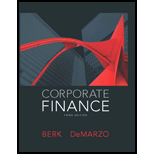
Corporate Finance
3rd Edition
ISBN: 9780132992473
Author: Jonathan Berk, Peter DeMarzo
Publisher: Prentice Hall
expand_more
expand_more
format_list_bulleted
Question
Chapter 17, Problem 19P
Summary Introduction
To determine: The highest
Introduction:
Effective tax rates mainly depend on the investors’ tax rates, which they are facing on the dividends and
Expert Solution & Answer
Want to see the full answer?
Check out a sample textbook solution
Students have asked these similar questions
Choose correct solution pl
Company A problem.
no ai
Question three solve
Chapter 17 Solutions
Corporate Finance
Ch. 17.1 - Prob. 1CCCh. 17.1 - Prob. 2CCCh. 17.2 - Prob. 1CCCh. 17.2 - In a perfect capital market, how important is the...Ch. 17.3 - Prob. 1CCCh. 17.3 - Prob. 2CCCh. 17.4 - Prob. 1CCCh. 17.4 - Prob. 2CCCh. 17.5 - Is there an advantage for a firm to retain its...Ch. 17.5 - Prob. 2CC
Ch. 17.6 - Prob. 1CCCh. 17.6 - Prob. 2CCCh. 17.7 - Prob. 1CCCh. 17.7 - Prob. 2CCCh. 17 - Prob. 1PCh. 17 - ABC Corporation announced that it will pay a...Ch. 17 - Prob. 3PCh. 17 - RFC Corp. has announced a 1 dividend. If RFCs...Ch. 17 - Prob. 5PCh. 17 - KMS Corporation has assets with a market value of...Ch. 17 - Natsam Corporation has 250 million of excess cash....Ch. 17 - Suppose the board of Natsam Corporation decided to...Ch. 17 - Prob. 9PCh. 17 - Suppose BE Press paid dividends at the end of each...Ch. 17 - The HNH Corporation will pay a constant dividend...Ch. 17 - Prob. 12PCh. 17 - Prob. 13PCh. 17 - Prob. 14PCh. 17 - Suppose that all capital gains are taxed at a 25%...Ch. 17 - Prob. 16PCh. 17 - Prob. 17PCh. 17 - Prob. 18PCh. 17 - Prob. 19PCh. 17 - A stock that you know is held by long-term...Ch. 17 - Clovix Corporation has 50 million in cash, 10...Ch. 17 - Assume capital markets are perfect. Kay Industries...Ch. 17 - Redo Problem 22., but assume that Kay must pay a...Ch. 17 - Harris Corporation has 250 million in cash, and...Ch. 17 - Redo Problem 22, but assume the following: a....Ch. 17 - Prob. 26PCh. 17 - Prob. 27PCh. 17 - Explain under which conditions an increase in the...Ch. 17 - Why is an announcement of a share repurchase...Ch. 17 - AMC Corporation currently has an enterprise value...Ch. 17 - Prob. 31PCh. 17 - Prob. 32PCh. 17 - Explain why most companies choose to pay stock...Ch. 17 - Prob. 34PCh. 17 - Prob. 35P
Knowledge Booster
Learn more about
Need a deep-dive on the concept behind this application? Look no further. Learn more about this topic, finance and related others by exploring similar questions and additional content below.Similar questions
- Solve this finance question.arrow_forwardCalculate emi solarrow_forwardAccording to car experts, which of the following ordinarily provides the best value in automobile ownership? Always buying a new car and driving it only a few years. Buying a relatively new used car and driving it for a long time. Buying the cheapest used car available.arrow_forward
- Pat and Chris have identical interest-bearing bank accounts that pay them $15 interest per year. Pat leaves the $15 in the account each year, while Chris takes the $15 home to a jar and never spends any of it. After five years, who has more money? Explarrow_forwardSolve this finance with no aiarrow_forwardExplain about corporate finance? no aiarrow_forward
- Solve it Pat and Chris have identical interest-bearing bank accounts that pay them $15 interest per year. Pat leaves the $15 in the account each year, while Chris takes the $15 home to a jar and never spends any of it. After five years, who has more money?arrow_forwardFinance question subject. solvearrow_forwardNo ai answerarrow_forward
arrow_back_ios
SEE MORE QUESTIONS
arrow_forward_ios
Recommended textbooks for you
 Essentials Of InvestmentsFinanceISBN:9781260013924Author:Bodie, Zvi, Kane, Alex, MARCUS, Alan J.Publisher:Mcgraw-hill Education,
Essentials Of InvestmentsFinanceISBN:9781260013924Author:Bodie, Zvi, Kane, Alex, MARCUS, Alan J.Publisher:Mcgraw-hill Education,

 Foundations Of FinanceFinanceISBN:9780134897264Author:KEOWN, Arthur J., Martin, John D., PETTY, J. WilliamPublisher:Pearson,
Foundations Of FinanceFinanceISBN:9780134897264Author:KEOWN, Arthur J., Martin, John D., PETTY, J. WilliamPublisher:Pearson, Fundamentals of Financial Management (MindTap Cou...FinanceISBN:9781337395250Author:Eugene F. Brigham, Joel F. HoustonPublisher:Cengage Learning
Fundamentals of Financial Management (MindTap Cou...FinanceISBN:9781337395250Author:Eugene F. Brigham, Joel F. HoustonPublisher:Cengage Learning Corporate Finance (The Mcgraw-hill/Irwin Series i...FinanceISBN:9780077861759Author:Stephen A. Ross Franco Modigliani Professor of Financial Economics Professor, Randolph W Westerfield Robert R. Dockson Deans Chair in Bus. Admin., Jeffrey Jaffe, Bradford D Jordan ProfessorPublisher:McGraw-Hill Education
Corporate Finance (The Mcgraw-hill/Irwin Series i...FinanceISBN:9780077861759Author:Stephen A. Ross Franco Modigliani Professor of Financial Economics Professor, Randolph W Westerfield Robert R. Dockson Deans Chair in Bus. Admin., Jeffrey Jaffe, Bradford D Jordan ProfessorPublisher:McGraw-Hill Education

Essentials Of Investments
Finance
ISBN:9781260013924
Author:Bodie, Zvi, Kane, Alex, MARCUS, Alan J.
Publisher:Mcgraw-hill Education,



Foundations Of Finance
Finance
ISBN:9780134897264
Author:KEOWN, Arthur J., Martin, John D., PETTY, J. William
Publisher:Pearson,

Fundamentals of Financial Management (MindTap Cou...
Finance
ISBN:9781337395250
Author:Eugene F. Brigham, Joel F. Houston
Publisher:Cengage Learning

Corporate Finance (The Mcgraw-hill/Irwin Series i...
Finance
ISBN:9780077861759
Author:Stephen A. Ross Franco Modigliani Professor of Financial Economics Professor, Randolph W Westerfield Robert R. Dockson Deans Chair in Bus. Admin., Jeffrey Jaffe, Bradford D Jordan Professor
Publisher:McGraw-Hill Education
Dividend explained; Author: The Finance Storyteller;https://www.youtube.com/watch?v=Wy7R-Gqfb6c;License: Standard Youtube License